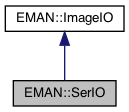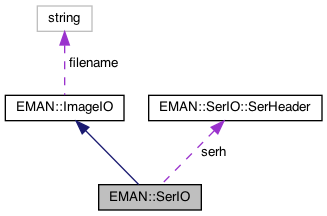SER (Series File Format) is a file format created by Dr. More...
#include <serio.h>


Classes | |
| struct | SerHeader |
Public Member Functions | |
| SerIO (const string &fname, IOMode rw_mode=READ_ONLY) | |
| ~SerIO () | |
| int | get_nimg () |
| Return the number of images in this image file. More... | |
 Public Member Functions inherited from EMAN::ImageIO Public Member Functions inherited from EMAN::ImageIO | |
| ImageIO (const string &fname, IOMode rw) | |
| virtual | ~ImageIO () |
| virtual int | read_header (Dict &dict, int image_index=0, const Region *area=0, bool is_3d=false)=0 |
| Read the header from an image. More... | |
| virtual int | write_header (const Dict &dict, int image_index=0, const Region *area=0, EMUtil::EMDataType filestoragetype=EMUtil::EM_FLOAT, bool use_host_endian=true)=0 |
| Write a header to an image. More... | |
| virtual int | read_data (float *data, int image_index=0, const Region *area=0, bool is_3d=false)=0 |
| Read the data from an image. More... | |
| virtual int | read_data_8bit (unsigned char *data, int image_index=0, const Region *area=0, bool is_3d=false, float minval=0.0f, float maxval=0.0f) |
| Read the data from an image as an 8 bit array, regardless of format. More... | |
| virtual int | write_data (float *data, int image_index=0, const Region *area=0, EMUtil::EMDataType filestoragetype=EMUtil::EM_FLOAT, bool use_host_endian=true)=0 |
| Write data to an image. More... | |
| virtual int | read_ctf (Ctf &ctf, int image_index=0) |
| Read CTF data from this image. More... | |
| virtual void | write_ctf (const Ctf &ctf, int image_index=0) |
| Write CTF data to this image. More... | |
| virtual void | flush ()=0 |
| Flush the IO buffer. More... | |
| virtual bool | is_complex_mode ()=0 |
| Is this an complex image or not. More... | |
| virtual bool | is_image_big_endian ()=0 |
| Is this image in big endian or not. More... | |
| virtual bool | is_single_image_format () const |
| Is this image format only storing 1 image or not. More... | |
| template<class T > | |
| void | become_host_endian (T *data, size_t n=1) |
| Convert data of this image into host endian format. More... | |
| string | get_filename () const |
Static Public Member Functions | |
| static bool | is_valid (const void *first_block) |
Public Attributes | |
| DEFINE_IMAGEIO_FUNC | |
Private Types | |
| enum | SerImgMode { oneD = 0x4120 , twoD = 0x4122 } |
| enum | SerTagType { timeOnly = 0x4152 , posTime = 0x4122 } |
| enum | SerDataMode { SER_UCHAR = 1 , SER_USHORT , SER_UINT , SER_CHAR , SER_SHORT , SER_INT , SER_FLOAT , SER_DOUBLE , SER_COMPLEX8 , SER_COMPLEX16 , UNKNOWN } |
Private Member Functions | |
| void | read_dim_arr (Dict &dict, int idx) |
| helper function to read attributes in dimension array More... | |
| void | read_data_element (Dict &dict) |
| helper function to read header attributes in data element More... | |
| void | read_data_tag (Dict &dict) |
| helper function to read header attributes in data tag More... | |
Private Attributes | |
| bool | is_new_file |
| SerHeader | serh |
| uint64_t * | data_offset_array |
| uint64_t * | tag_offset_array |
| int | nimg |
| int | nx |
| int | ny |
| int | nz |
| int | datatypeid |
| int | datamode |
Additional Inherited Members | |
 Public Types inherited from EMAN::ImageIO Public Types inherited from EMAN::ImageIO | |
| enum | IOMode { READ_ONLY = 1 , READ_WRITE = 2 , WRITE_ONLY = 3 } |
 Protected Member Functions inherited from EMAN::ImageIO Protected Member Functions inherited from EMAN::ImageIO | |
| virtual void | init ()=0 |
| Do some initialization before doing the read/write. More... | |
| void | check_read_access (int image_index) |
| Validate 'image_index' in file reading. More... | |
| void | check_read_access (int image_index, const float *data) |
| Validate 'image_index' and 'data' in file reading. More... | |
| void | check_write_access (IOMode rw_mode, int image_index, int max_nimg=0) |
| Validate rw_mode and image_index in file writing. More... | |
| void | check_write_access (IOMode rw_mode, int image_index, int max_nimg, const float *data) |
| Validate rw_mode, image_index, and data pointer in file writing. More... | |
| void | check_region (const Region *area, const FloatSize &max_size, bool is_new_file=false, bool inbounds_only=true) |
| Validate image I/O region. More... | |
| void | check_region (const Region *area, const IntSize &max_size, bool is_new_file=false, bool inbounds_only=true) |
| Validate image I/O region. More... | |
| FILE * | sfopen (const string &filename, IOMode mode, bool *is_new=0, bool overwrite=false) |
| Run fopen safely. More... | |
 Protected Attributes inherited from EMAN::ImageIO Protected Attributes inherited from EMAN::ImageIO | |
| string | filename |
| IOMode | rw_mode |
| FILE * | file = nullptr |
| bool | initialized = false |
Detailed Description
SER (Series File Format) is a file format created by Dr.
Chris Boothroyd. The file format is used by TIA (Tecnai imaging and analysis), which is the program used on FEI Tecnai and Titan microscopes for acquiring and displaying scanned images and spectra.
Each .ser file stores a number of 1D or 2D images. We do not support complex SER image for now.
http://www.microscopy.cen.dtu.dk/~cbb/info/TIAformat/index.html
Member Enumeration Documentation
◆ SerDataMode
|
private |
◆ SerImgMode
|
private |
◆ SerTagType
|
private |
Constructor & Destructor Documentation
◆ SerIO()
◆ ~SerIO()
| SerIO::~SerIO | ( | ) |
Definition at line 52 of file serio.cpp.
References data_offset_array, EMAN::ImageIO::file, and tag_offset_array.
Member Function Documentation
◆ get_nimg()
|
virtual |
Return the number of images in this image file.
Reimplemented from EMAN::ImageIO.
Definition at line 368 of file serio.cpp.
References EMAN::ImageIO::file, EMAN::ImageIO::filename, ImageReadException, EMAN::ImageIO::init(), nimg, portable_fseek(), and ValidNumberElementsOffset.
◆ is_valid()
|
static |
Definition at line 94 of file serio.cpp.
References ENTERFUNC, and EXITFUNC.
Referenced by EMAN::EMUtil::fast_get_image_type(), and EMAN::EMUtil::get_image_type().
◆ read_data_element()
|
private |
helper function to read header attributes in data element
Definition at line 441 of file serio.cpp.
References datamode, datatypeid, EMAN::ImageIO::file, EMAN::ImageIO::filename, ImageReadException, nx, ny, nz, oneD, and twoD.
◆ read_data_tag()
|
private |
helper function to read header attributes in data tag
Definition at line 523 of file serio.cpp.
References EMAN::ImageIO::file, EMAN::ImageIO::filename, ImageReadException, posTime, and timeOnly.
◆ read_dim_arr()
|
private |
helper function to read attributes in dimension array
Definition at line 380 of file serio.cpp.
References EMAN::ImageIO::file, EMAN::ImageIO::filename, ImageReadException, and EMAN::Util::int2str().
Member Data Documentation
◆ data_offset_array
|
private |
◆ datamode
|
private |
Definition at line 116 of file serio.h.
Referenced by read_data_element().
◆ datatypeid
|
private |
Definition at line 115 of file serio.h.
Referenced by read_data_element().
◆ DEFINE_IMAGEIO_FUNC
◆ is_new_file
◆ nimg
|
private |
Definition at line 111 of file serio.h.
Referenced by get_nimg().
◆ nx
|
private |
Definition at line 112 of file serio.h.
Referenced by read_data_element().
◆ ny
|
private |
Definition at line 113 of file serio.h.
Referenced by read_data_element().
◆ nz
|
private |
Definition at line 114 of file serio.h.
Referenced by read_data_element().
◆ serh
◆ tag_offset_array
|
private |
The documentation for this class was generated from the following files: